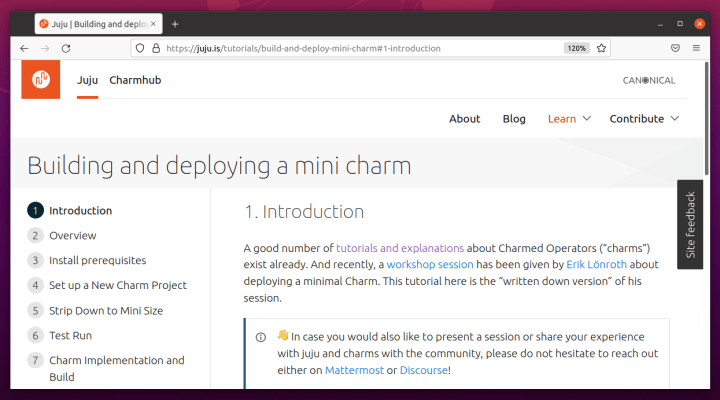Learn how to build a minimal Charm
Michael C. Jaeger
on 11 February 2022
Tags: Charmed Operators , Community , Juju , Software Operators
The previous blog post talked about the community workshops taking place in the Juju and Charm community. Normally the community workshops take place every Friday at 10:00 am CET. The details for these workshops can be found in the public channel on Mattermost. In one of the workshops, Erik Lönroth held a tutorial on how to build a minimal Charm.
A Charm tutorial from the community
Unlike existing tutorials, Erik’s tutorial presumes an empty computer with a vanilla OS. It explains every step when you start from nothing.

Charming requires a test and development environment, where the application can be run and deployed. Accordingly, the first steps of the tutorial are not only about installing the tool named Charmcraft. The first steps also involve the local environments, Juju and LXD.
LXD runs and manages containers in your local environment, just like a local cloud. This local cloud will be used to run your application. At the same time Juju coordinates the local cloud software and runs the Charm for your application. After the deployment and setup of prerequisites have been finished, the tutorial goes ahead. It will explain creating and building a very simple Charm derived from Erik’s collection of example projects on his Github account.
So, in case you are new to Charming, and you are new to Juju and would like to start with a very first experiment: the new tutorial Build and Deploy a Minimal Charm is online now!
And if you are ready to continue on the Charming journey, you can also access more step-by-step guides in the Juju tutorials section. Further, great video tutorials about Charming are on our YouTube channel, such as the excellent recording of a workshop for building a charmed operator by Jon Seager.
Further readings
- Building and deploying a mini charm
- Juju tutorials page
- Matternost Juju and Charms community channels
Talk to us today
Interested in running Ubuntu in your organisation?
Newsletter signup
Related posts
Kubecon EU 2023: Operator Day hosted by Canonical – recordings available
The Operator Day at KubeCon EU 2023, hosted by Canonical, took place on Monday, 17 April 2023. We thank everyone for attending the event. Our thanks go out...
Operate popular open source on Kubernetes – Attend Operator Day at KubeCon EU 2024
Operate popular open source on Kubernetes – Attend Operator Day at KubeCon EU 2024
Understanding roles in software operators
In today’s blog we take a closer look at roles – the key elements that make up the design pattern – and how they work together to simplify maintaining...
